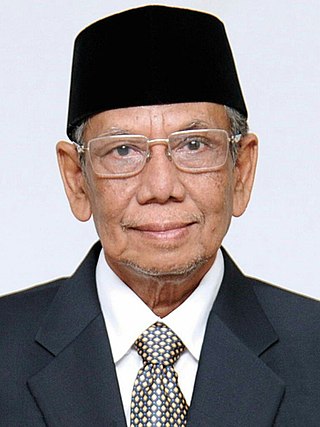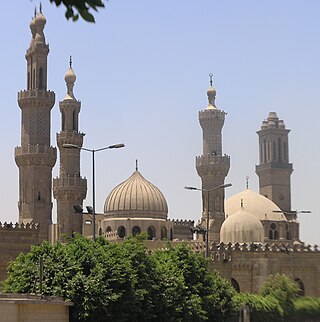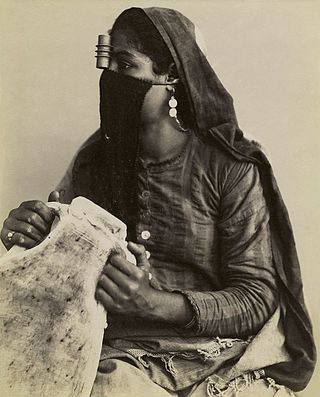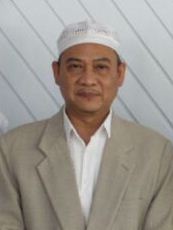
The Al-Azhar University is a public university in Cairo, Egypt. Associated with Al-Azhar Al-Sharif in Islamic Cairo, it is Egypt's oldest degree-granting university and is known as one of the most prestigious universities for Islamic learning. In addition to higher education, Al-Azhar oversees a national network of schools with approximately two million students. As of 1996, over 4,000 teaching institutes in Egypt were affiliated with the university.

Abdurrahman Wahid, though more colloquially known as Gus Dur, was an Indonesian politician and Islamic religious leader who served as the 4th president of Indonesia, from his election in 1999 until his removal from power in 2001. A long time leader within the Nahdlatul Ulama organization, he was the founder of the National Awakening Party (PKB). He was the son of Minister of Religious Affairs Wahid Hasyim, and the grandson of Nahdatul Ulama founder Hasyim Asy'ari. He had a visual impairment caused by glaucoma; he was blind in the left eye and partially blind in his right eye. He was the first and as of 2023 the only president of Indonesia to have had physical disabilities.

Nahdlatul Ulama is an Islamic organization in Indonesia. Its membership estimates range from 40 million (2013) to over 95 million (2021), making it the largest Islamic organization in the world. NU is also a charitable body funding schools and hospitals as well as organizing communities to help alleviate poverty.

Sufi Abu Taleb was an Egyptian politician. He served as Speaker of the People's Assembly from 1978 to 1983 and, following the assassination of Anwar Sadat on 6 October 1981, assumed the duties of acting head of state for eight days per the Egyptian Constitution. He subsequently stepped aside for Sadat's Vice President Hosni Mubarak.

Pesantren, or pondok pesantren, are Islamic boarding schools in Indonesia. They consist of pondok, mosque, santri, teaching of classical Islamic texts and Kyai. According to one popular tradition, the pesantren education system originated from traditional Javanese pondokan; dormitories; ashram for Hindu or viharas for Buddhists to learn religious philosophies, martial arts and meditation. Institutions much like them are found across the Islamic world and are called pondok in Malaysia and Southern Thailand and madrasa Islamia in India and Pakistan and much of the Arabic-speaking world. The pesantren aim is to deepen knowledge of the Qurʾān, particularly through the study of Arabic, traditions of exegesis, the Sayings of the Prophet, law and logic. The term pesantren derives from the root word santri or student -- pe-santri-an or the place of the santri.

A kyai is an expert in Islam, usually used among the ethnic Javanese people.

Ahmad Mustofa Bisri is an Indonesian Islamic leader from Indonesia and was the ninth Chief Adviser of Nahdlatul Ulama. He is the head of Pondok Pesantren Raudlatuth Thalibin, Rembang, Central Java, Indonesia. Mustofa Bisri, well known as Gus Mus, is famous not only as a kyai—traditional Islamic teacher & leader, but also as a poet and painter.

Achmad Hasyim Muzadi was an Indonesian Islamic scholar and cleric who served as chairman of the Nahdlatul Ulama, from 1999 to 2010. The founder and director of the Al-Hikam Islamic boarding school, he was a proponent of moderate Islam, which he defined as being neither radical nor liberal, and criticized both Islamic fundamentalism and Islamic liberalism. Hasyim was the vice presidential running mate of President Megawati Sukarnoputri in the 2004 Indonesian presidential election, though the ticket was defeated in a runoff. He subsequently served in the Presidential Advisory Council from 2015 until his death.

Al-Azhar Mosque, known in Egypt simply as al-Azhar, is a mosque in Cairo, Egypt in the historic Islamic core of the city. Commissioned by Jawhar al-Siqilli shortly after Cairo was established as the new capital of the Fatimid Caliphate in 970, it was the first mosque established in a city that eventually earned the nickname "the City of a Thousand Minarets". Its name is usually thought to derive from az-Zahrāʾ, a title given to Fatimah, the daughter of Muhammad.
Zuhairi Misrawi is an Indonesian writer. Misrawi first gained public notice as a young intellectual at Nahdlatul Ulama (NU), and a traditionalist member of the Sunni Islam group in Indonesia. Misrawi completed his undergraduate education with the Creed-Philosophy Department, Faculty of Usul al-Din, Al-Azhar University, Cairo, Egypt (1995–2000). Returning from Cairo, Misrawi was an active participant in the Institute for Study and Human Resource of Nahdlatul Ulama and was the Coordinator of Study and Research in 2000–2002. Misrawi is close to the world of contemporary Islamic thought and has served as director of the "Moderate Muslim Society".

Muhammad Metwalli al-Sha'rawi was an Islamic scholar, former Egyptian minister of Endowments and Maliki jurist. He has been called one of Egypt's most popular and successful Islamic preachers, and "one of the most prominent symbols of popular Egyptian culture" in the 1970s, 1980s and 1990s.

In a predominantly Muslim society, as many as 90% of women in Egypt have adopted a form of veiling. A majority of Egyptian women cover at least their hair with the hijab. A hijab refers to a head covering that is worn by Muslim women. Although the phenomenon of wearing the niqāb, a veil which covers the face is not as common, the niqab in Egypt has become more prevalent. While a few women in Egypt wear a black niqab along with a billowing black abaya as seen in countries such as Saudi Arabia, many choose to wear different colors of the niqab or manipulate the hijab to cover their face. Regardless, the growing trend of munaqqabat, or women who wear the niqab, has alarmed the authorities. They have begun to see this dress as a security threat, because it hides the face, and because it is perceived as a political statement, a rejection of the state in favor of a strict Islamic system.

The Indonesian Solidarity Party is a political party in Indonesia that focuses on women's rights, pluralism, and Indonesian youth. It is led by Kaesang Pangarep.

Ganjar Pranowo is an Indonesian politician who served as the governor of Central Java between 2013 and 2023. He is a member of the nationalist Indonesian Democratic Party of Struggle (PDI-P). Previously, he represented Central Java as a national legislator in the People's Representative Council (DPR) for two terms – 2004–2009 and 2009–2013.
Pondok Modern Darussalam Gontor Ponorogo, also known as Pondok Modern Gontor, or abbreviated as PMDG, or simply Pesantren Gontor, is a pesantren in Ponorogo Regency, East Java, Indonesia. Since its founding in 1926, the pesantren has become famous for the application of discipline, heavy emphasis of foreign languages, and strong network and cadre of alumni. It also has been an educational institution known for not specifically tied to any political and social organization. The pesantren is considered a backbone of Muslim society in Indonesia, producing numerous leading figures of the history of Islam in Indonesia.
Burhanuddin Ulakan Pariaman, also known as Sheikh Burhanuddin Ulakan, was an Islamic cleric (ulama) from the Minangkabau region. He is regarded as the pioneer of Islamic propagators in West Sumatra. He is also known as a commanding figure of the Islamic movements against the Dutch colonization. Regarding his Islamic belief, he was a Sufi murshid belonging to the Shattari tariqa based in Minangkabau region.

Abuya Kyai Hajji Uci Turtusi bin Dimyati, better known as Abuya Uci, was an influential Indonesian Muslim cleric and preacher from Banten. Uci was the leader of the Pondok Pesantren Salafiyah Al-Istiqlaliyah Cilongok who succeeded his father, Abuya Dimyati bin Romli, who died in early 2001. The Pesantren was founded in 1957 by Abuya Dimyati, an influential cleric in the Tangerang Regency.
Muhammad Abdullah Draz (1958-1894) was a prominent Egyptian Quran scholar and Professor of Islamic studies at Al-Azhar University.
Abla al-Kahlawi was an Egyptian scholar and teacher of Islamic jurisprudence, as well as a religious leader, preacher, and television presenter. She taught at Al Azhar University in Cairo, Egypt, where she was the Dean of the Faculty of Islamic and Arabic Studies at the Women's College. She was listed on the inaugural edition of The 500 Most Influential Muslims for her work on religion and women, in 2009, and has published widely on women and Islamic jurisprudence. She preached in Egypt, in person and on television, as well as in Saudi Arabia, and notably preached every day for two years at the Masjid al-Ḥaram, Islam's most important mosque in Saudi Arabia, between 1987 and 1989.
















